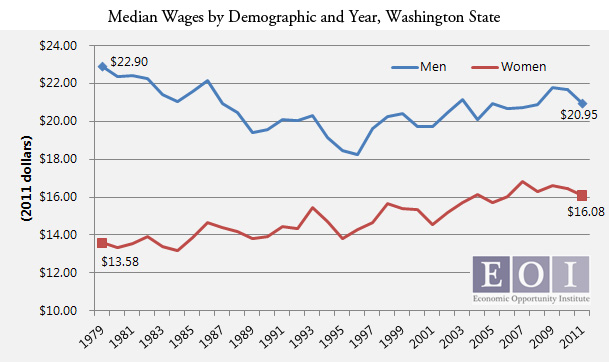A recent flurry of publications has documented a rise in wealth among U.S. women. In general, women are earning more than they did two decades ago – which has contributed to a narrowing of the pay gap. But men’s earnings have also been on the decline and the pay gap still exists – and it’s not going anywhere any time soon.
Here in Washington, women at the median took home just 66% of men’s earnings in 2011, with annual earnings of $25,803 compared to men’s $39,269. When broken out by racial group, the same storyline emerges. Within every group men are out-earning women, with the largest gaps among Asians and Whites.
And here’s the kicker: no group’s median earnings have seen significant and sustained improvement. And it’s not just due to the recession. Asian women were making gains through 2010, before taking a dive again in 2011; and Black men’s earnings began falling even before the Great Recession hit.
While it’s true that women are more likely to work part-time, the gender wage gap exists even among full-time, year-round workers. On par with national statistics on median wages, Washington women working full-time took home a paycheck that was just 77% of men’s, mirroring the gap in hourly wages.
Median hourly pay for Washington women was $16.08 in 2011 – 77% of men’s $20.95. This is an increase compared to the 59% of inflation-adjusted earnings in 1979. However, little has changed from 1994 when the wage ratio first reached 77%. Since then, women’s earnings peaked at 81% of men’s in 2007, only to fall again over the recession.
Overall, just about everyone’s earnings are down since the start of the Great Recession. But while some some increases are expected as the economy gets back on track, the gender wage gap will no doubt remain significant throughout the recovery and recessions to come.
More To Read
May 19, 2025
A year of reflections, a path forward
Read EOI Executive Director's 2025 Changemaker Dinner speech
March 24, 2025
Remembering former Washington State House Speaker Frank Chopp
Rep. Chopp was Washington state’s longest-serving Speaker of the House
February 11, 2025
The rising cost of health care is unsustainable and out of control
We have solutions that put people over profits


